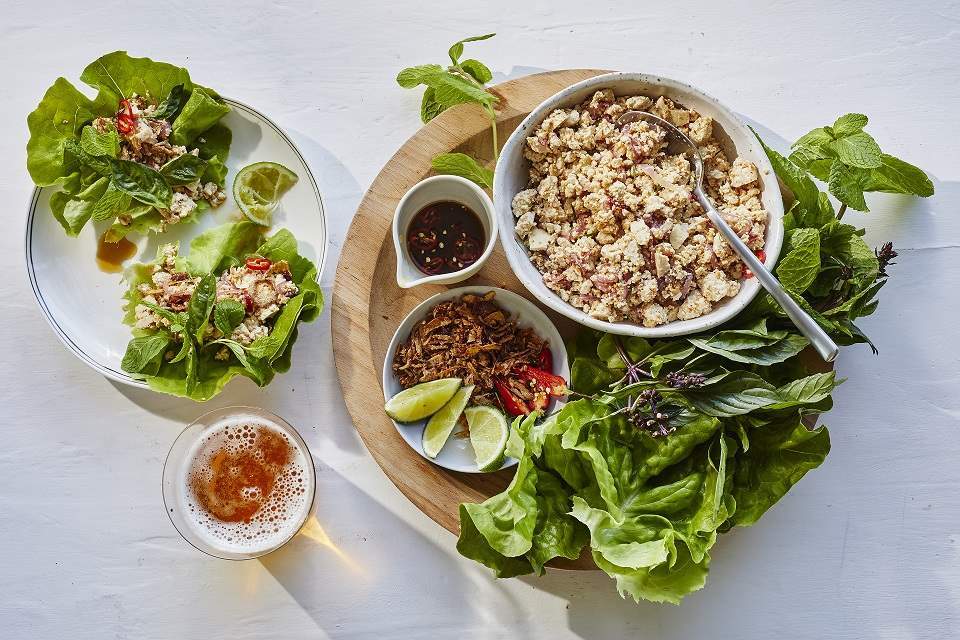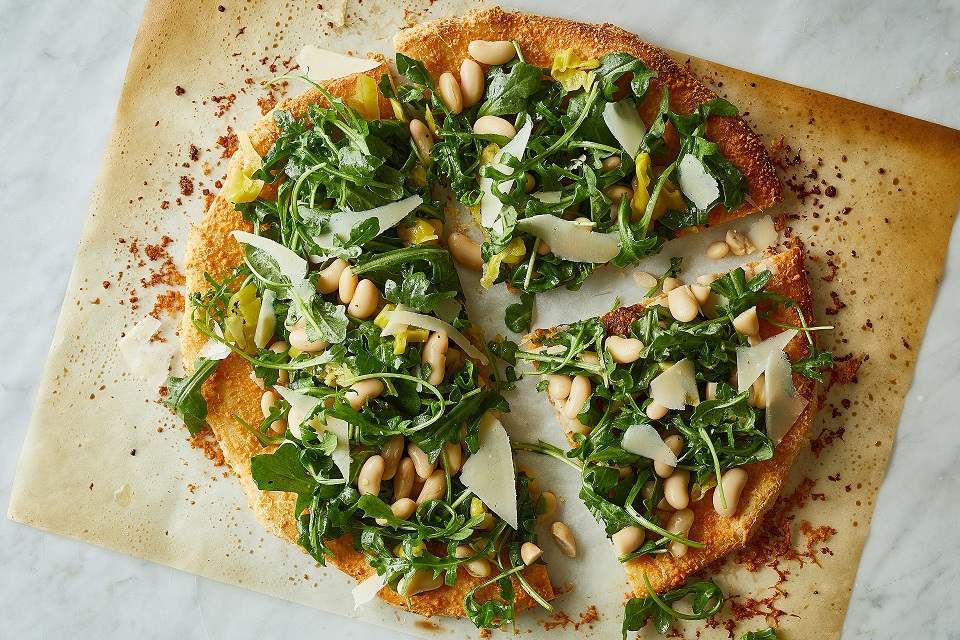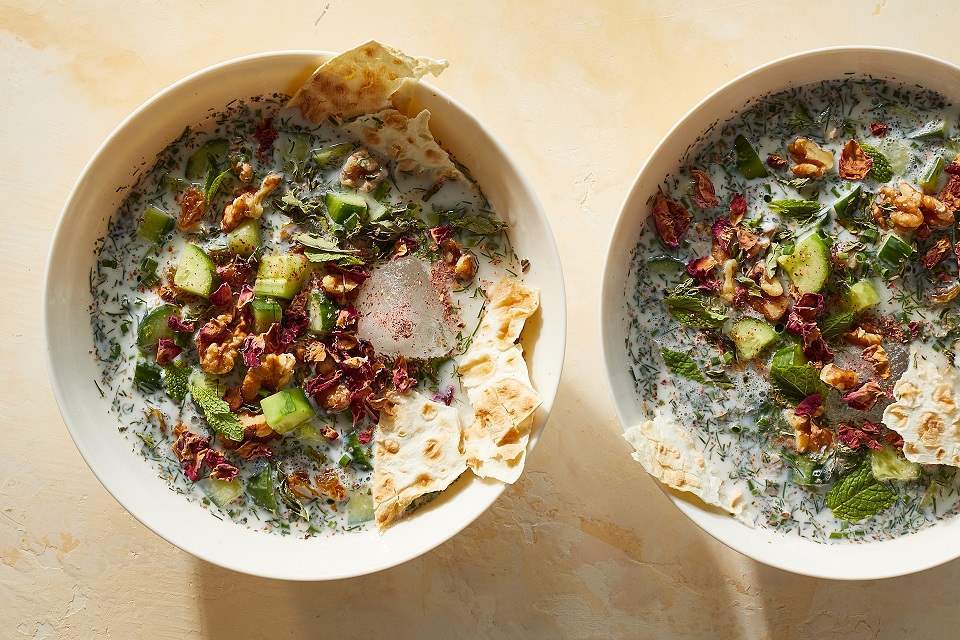By trade, I’m an omnivore. The only food rule I
follow is that I eat everything, because anything can lead to deliciousness.
Maybe it’s goat meat on the bone, cooked low and slow and served in a dark pool
of its own cooking juices. Maybe it’s a bloomy wheel of cheese made from cashew
milk, dense and creamy in the middle. If it’s good, I want it, and then I want
seconds.
اضافة اعلان
But when I cook at home, what I want more and more of is
vegetables. Right now, this instant, I want long, skinny tongues of charred
eggplant dressed in soy sauce and maple syrup, over rice. I want bright tomato
pulp puréed with bread and olive oil, right from the lip of the bowl. I want a
big pile of lettuce leaves filled with Hetty McKinnon’s sweet and spicy tofu
larb.
When the weather cools down? I want a hot pot of winter
greens and chewy noodles in miso broth. I want my favorite toor dal with whole
boiled peanuts. I want sweet-edged, wrinkly roasted root vegetables over heaps
of cheesy polenta, swimming in olive oil.
I don’t know exactly when my appetite became so intensely
focused on vegetarian foods in my own kitchen. It happened slowly, then all at
once, like a custard thickening on the stovetop. I revised my food shopping,
and my home cooking followed, branching out and expanding. I went back to old,
favorite cookbooks that included meat and fish only occasionally, or not at
all, like “River Cafe Cook Book Green,” by Rose Gray and Ruth Rogers, and
“Classic Indian Vegetarian Cookery,” by Julie Sahni.
Maybe you’re drawn to vegetarian food for ethical reasons,
for health reasons, for ecological reasons, for reasons you can’t quite explain
just yet. Maybe you’re trying to get out of a kitchen rut. Maybe, like me, you
really love to eat well, and you want to cook with vegetables more.
Persian cucumbers, roughly peeled, chopped, and plopped into
a blend of buttermilk and yogurt, quickly form the base of Naz Deravian’s
abdoogh khiar, an Iranian chilled soup, crunchy with walnuts, which is quick to
make, and life-affirming in this late summer heat.
I’m energized by cooks who coax the best out of vegetables,
and not only professionals — restaurant cooks, recipe developers, cookbook
authors who’ve been working with vegetarian food for far longer than me — but
also friends, family and other home cooks who have patiently walked me through
a technique or documented their work online.
Just when I thought I might be getting a little bit sick of
salads, for example, Ali Slagle went and put one on a pizza. And not just any
pizza, but a super thin-crust pizza covered entirely with a crisp, lacy layer
of Parmesan cheese. With all due respect to California Pizza Kitchen, and the
chain’s tricolore salad pizza, it is infinitely better than its inspiration.
Piling salad on a cheesy, thin-crust pizza is the kind of
smart, simple technique I know I’ll practice again, not only exactly as
written, with baby arugula and white beans on top, but maybe with crunchy
lettuce in a tahini ranch dressing, or lots of sautéed summer squash. Or maybe
with some cherry tomatoes, roasted until they burst, tossed with olive oil and
big pieces of torn basil. It’s official, salad pizza is now a part of my
repertoire.
And that’s the thing about a good vegetarian recipe: It
leads you to a delicious meal, then makes hundreds more possible.
Recipe: Tofu larb
 Tofu larb in Sydney, Australia on June 15, 2021. The world
of vegetarian cooking is vast and diverse, and our new newsletter celebrates
exactly that. (Photo: Christopher Simpson/The New York Times)
Tofu larb in Sydney, Australia on June 15, 2021. The world
of vegetarian cooking is vast and diverse, and our new newsletter celebrates
exactly that. (Photo: Christopher Simpson/The New York Times)
Total time: 20 minutes
Yield: 4 servings
For the tofu:
3 tablespoons uncooked glutinous (sticky) or jasmine rice
2 (14-ounce) packages extra-firm tofu, drained and patted
dry
1 tablespoon neutral oil, such as grapeseed or vegetable
1 lemongrass stem, outer layer removed, tender stem finely
chopped
1 shallot, halved and thinly sliced
4 makrut lime leaves (optional), thinly sliced
1 cup mixed soft herbs, such as mint, Thai basil, basil,
cilantro and chopped scallions
1 teaspoon kosher salt, plus more as needed
1 head butter lettuce, leaves separated
1/4 cup store-bought crispy fried shallots or onions
For the dressing:
4 tablespoons fresh lime juice (from about 2 limes)
3 tablespoons dark or light brown sugar
2 tablespoons soy sauce
1/2 teaspoon red-pepper flakes or 1/2 to 1 red chile, such
as bird’s eye, finely chopped
1. Make the toasted rice powder: Heat a medium (10-inch)
skillet over medium-high. Add the rice and stir constantly for 4 to 6 minutes
until golden, with a nutty aroma. Transfer rice to a mortar and pestle or spice
grinder and grind until it is a coarse powder. (You don’t want it too fine;
some texture is nice.) You should have about 3 1/2 tablespoons. Set rice powder
aside.
2. Make the dressing: In a small bowl, combine the lime
juice, brown sugar, soy sauce and red-pepper flakes; whisk until the sugar is
dissolved.
3. Crumble the tofu into small chunks and place in a large
bowl.
4. Heat the medium skillet over medium-high and add 1
tablespoon oil. Add the lemongrass and shallot and cook, stirring constantly,
until softened and aromatic, about 2 minutes. Remove from heat and add to the
tofu, along with the lime dressing, rice powder, makrut lime leaves, herbs, and
salt. Taste and add more salt if needed.
5. To serve, spoon the tofu larb into the lettuce leaves and
garnish with crispy fried shallots.
(Recipe from Hetty McKinnon)
Recipe: Salad pizza with white beans and parmesan
 Salad pizza with white beans and parmesan in Sydney, Australia on June 15, 2021. The world of vegetarian cooking is vast and diverse, and our new newsletter celebrates exactly that. (Photo: Christopher Simpson/The New York Times)
Salad pizza with white beans and parmesan in Sydney, Australia on June 15, 2021. The world of vegetarian cooking is vast and diverse, and our new newsletter celebrates exactly that. (Photo: Christopher Simpson/The New York Times)
Yield: 4 servings
1 (15-ounce) can white beans, such as cannellini or Great
Northern, rinsed
1/4 cup sliced pickled pepperoncini (about 6 to 8 peppers),
plus 2 tablespoons brine
2 tablespoons extra-virgin olive oil, plus more for greasing
Kosher salt and black pepper
1 pound store-bought or homemade pizza dough, at room
temperature, divided into two 8-ounce portions
1 cup freshly grated Parmesan, plus more for serving
3 to 5 ounces baby arugula
1. Heat the oven to 500 degrees. Place a sheet pan in the
oven to heat.
2. In a large bowl, stir together the white beans,
pepperoncini, pickle brine and 2 tablespoons extra-virgin olive oil. Season
with salt and pepper; set aside.
3. Place a kitchen towel on a work surface, then place an
upside-down sheet pan or cutting board on the towel. (This will serve as your
pizza peel; the towel stabilizes the setup as you roll the dough). Lightly
grease a piece of parchment with olive oil and place on top of the upside-down
sheet pan. With a lightly greased rolling pin, roll one half of the dough on
the parchment as thin as you can, about 1/8- to 1/4-inch-thick. (If the dough
retracts, let it rest a few minutes before continuing.)
4. Sprinkle 1/2 cup Parmesan over the dough. Remove the
preheated sheet pan from the oven, and carefully slide the parchment with the
dough onto the hot baking sheet. Cook until golden brown on the top and bottom,
10 to 12 minutes. Meanwhile, roll out the remaining dough on a second piece of
greased parchment and cover with the remaining 1/2 cup Parmesan. Transfer the
first pizza to a cooling rack to crisp, then repeat with the second piece of
dough.
5. Add the arugula to the bean mixture, season with salt and
pepper, and stir gently to combine. Top each pizza with the salad, plus more
grated or shaved Parmesan.
(Recipe from Ali Slagle)
Recipe: Abdoogh khiar (chilled buttermilk cucumber soup)
 Abdoogh Khiar (chilled buttermilk cucumber soup)
in Sydney, Australia on June 15, 2021. The world of vegetarian cooking is vast
and diverse, and our new newsletter celebrates exactly that. (Photo: Christopher
Simpson/The New York Times)
Abdoogh Khiar (chilled buttermilk cucumber soup)
in Sydney, Australia on June 15, 2021. The world of vegetarian cooking is vast
and diverse, and our new newsletter celebrates exactly that. (Photo: Christopher
Simpson/The New York Times)
Total time: 15 minutes, plus chilling
Yield: 2 to 4 servings
1 teaspoon dried edible Damask rose petals (optional; see
Tip)
2 cups buttermilk, plus more if desired
1/2 cup plain yogurt
Kosher salt (Diamond Crystal)
3 Persian cucumbers (7 ounces), cut into 1/4-inch pieces,
plus more for garnish
1/3 cup golden or black raisins, plus more for garnish
1/4 cup walnut halves, coarsely chopped, plus more for
garnish
1/4 cup finely chopped fresh dill, plus sprigs for garnish
1/4 cup finely chopped chives or green onion
1 teaspoon dried mint, plus more for garnish
1/2 lavash rectangle or 1 large slice bread of choice (such
as sourdough)
4 ice cubes
Fresh mint leaves, for garnish
1. If using dried rose, crumble a few petals coarsely for
garnish and set aside. Place the rest on a cutting board and chop as finely as
possible.
2. Place the buttermilk, yogurt and 1 teaspoon salt in a blender
and blend until frothy, about 30 seconds, or whisk together in a large bowl
until smooth and frothy. If you used a blender, pour the mixture into a large
bowl. Add the cucumbers, raisins, walnuts, dill, chives, dried mint and 1/4
teaspoon of the finely chopped rose petals. Stir well to combine and season to
taste with more salt. Cover and refrigerate to chill and allow the flavors to
come to life, at least 1 hour and up to overnight.
3. Just before serving, toast the lavash or bread until
crisp but not burned, and break into pieces. Stir the soup to mix. It should be
the consistency of a thin, runny soup. If it’s too thick, thin it out with
water or more buttermilk, 1 tablespoon at a time. Keep in mind that you will be
adding ice cubes, which will also thin out the soup as they melt. Divide the
soup among serving bowls and add the ice cubes. Garnish the top as creatively
as you like with crumbled dried rose petals, cucumber, dried mint, dill sprigs,
raisins, walnuts, and fresh mint leaves. Add the bread pieces right before
serving or serve on the side.
(Recipe from Naz Deravian)
Read more Lifestyle







